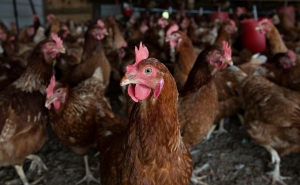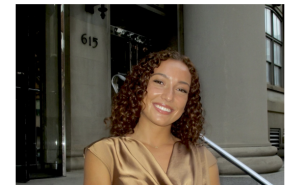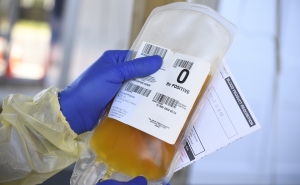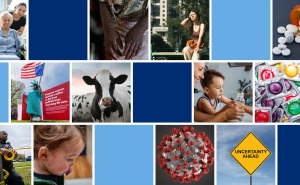Your Questions About COVID-19, Answered
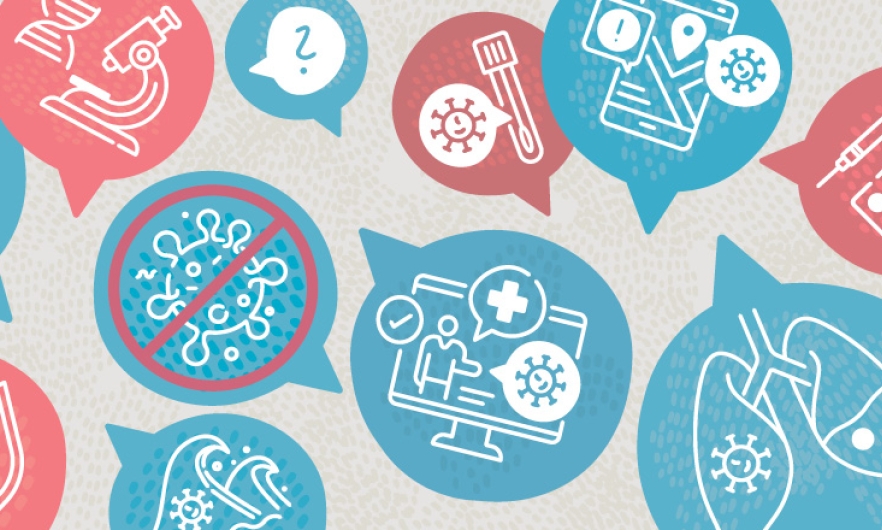
Josh Sharfstein, MD, and Caitlin Rivers, PhD, answer frequently asked questions about COVID-19.
Why do COVID-19 vaccines require two doses? Will I still have to wear a mask and practice social distancing once I get the vaccine? If my friends and I had COVID, can we get together? Are people who wear a face covering with their nose exposed at higher risk of getting COVID?
In this Q&A, adapted from the December 18, episode of Public Health On Call, Josh Sharfstein, MD, and Caitlin Rivers, PhD, MPH, answer some frequently asked questions about COVID-19 and vaccines.
Q&A
Are people who wear a face covering but have their nose exposed at higher risk for getting COVID?
It’s better to keep both your nose and your mouth covered with the mask. That’s really going to afford the highest protection both to you and the people around you.
Does the material of the mask matter?
You want to wear a mask that is tightly woven, and it’s better if it’s a couple layers. You don’t want it to be hard to breathe, but it is better to have a thicker, more tightly woven mask than something loose and ill-fitting.
Is it known why certain people have long-term symptoms? Is it because of their age or underlying conditions?
It’s not necessarily linked to older age or underlying health conditions. People who are young and previously healthy can experience lingering sequelae, or long-term lingering symptoms, of COVID-19 infection. It’s not really clear what the biological mechanism of that is, but it’s clear that it is a problem and it’s going to be something we’re going to have to be grappling with collectively as we figure out how best to support and care for those people.
Given how many cases of COVID are around in the U.S. right now, should I be sheltering in place if I am at high risk of severe disease?
If you are at high risk of severe illness, it would be a good time to take those extra protective actions. Sheltering in place is a good option if you have that available to you. You can order groceries, you can do telemedicine—there are a lot of opportunities today to take extra steps to stay home, and now is a good time to really lean in on that.
If I’ve had COVID and my friends have had COVID, can we just get together?
It’s still not recommended. It’s believed that after you recover, you are protected from reinfection, but we are again in a particularly bad place in the pandemic, and it is not the time to be taking risks or to rely on things that we hope are true. It’s best to just stay home.
Is it possible for a person to be reinfected and pass it on to somebody?
It’s still a possibility; there’s a lot we don’t know. I think now is, again, not a good time to chance it.
Why do the COVID-19 vaccines require two doses?
The second dose boosts the immune response so that people can fight off infection of the actual coronavirus. There is clearly some protection from the first shot; how much there is, though, isn’t known. There will be more research done to see whether one shot might be enough, but for now, the evidence is really about two shots.
If someone is between the first dose and the second dose, how should they conduct themselves?
They have to be careful. There is pretty much the normal rate of vulnerability to COVID in that first week. It looks like there’s a benefit two weeks after the first shot, when people start to see some protection, but there’s still that risk there.
If someone is planning on getting vaccinated, do both doses have to come from the same manufacturer, and how should people keep track of that? What if you receive one dose from one manufacturer and the second from the other?
These vaccines were only studied where people got the same type of vaccine twice. It’s best to get both doses from the same manufacturer in order to match up with where the evidence is. Those vaccines were 95% efficacious when they were studied that way. When you get the first shot, ask ahead how you’ll be receiving your second shot. In general, these vaccination programs should be telling you at the first shot how you’re going to get the second shot of the same kind of vaccine.
Will people get to choose which vaccine they get?
Shipments are going to specific places. Nursing homes, for example, maybe getting one vaccine; the hospital may be getting another. It’s unlikely that people will be able to choose. I don’t think right now there will be vaccine programs where there are two coolers there. I think because of the scarcity it’s going to be one set of deliveries to a particular place. Over time that may well change as the supply increases.
What type of side effects should people expect from the COVID-19 vaccines?
These vaccines were studied in very large trials—tens of thousands of patients got the vaccines—and the side effects looked pretty manageable. In general, a lot of people get a sore arm. People can also get a bit of a fever, maybe fatigue, headaches, joint pains—but those tend to go away very quickly. Those are really signs that the immune system is responding to the vaccine and is going to be ready for the coronavirus. They also looked very intently for more severe side effects and did not find any that were related to vaccination.
As time goes on, they are going to be tracking a number of different things with vaccination because they’re going from tens of thousands of people to millions of people. It’s possible that there will be more information about side effects and potentially even some new very rare side effects that do pop up. But it’s important to put this in the context of the alternative—the alternative of taking a vaccine is not just living your life; the alternative is being vulnerable to COVID.
How will I know that a COVID-19 vaccine is available to me?
Be alert to the news about how the vaccine is rolling out. Check with your local health department or your physician, who should know the right way to be getting updates.
Should people who already had COVID-19 and recovered still be vaccinated?
Yes. We’re going to learn a lot more about the effectiveness of the vaccine for different groups of people, including people who had been exposed before. It’s possible that there might be variations in that recommendation, but for right now, the safer thing to do, and what wound up being recommended, is for people to get the vaccine. It is quite possible that the vaccination is going to provoke a stronger immune response, more protection for the individual, than getting sick, at least for people who had mild illness, but we don’t know that for sure yet.
After people have been vaccinated, will they still have to wear a mask and practice social distancing?
If there is still a lot of virus out there being passed around, then people probably are going to be asked to wear masks and keep socially distant in order to reduce the spread and prevent the chance that the virus comes into contact with someone who is vulnerable and could get quite sick. Over time, as more people get vaccinated and as more people take other precautions, the amount of virus is going to go down a lot. When those rates go way down, I think that the restrictions on our behavior might change.
What we don’t understand fully about the vaccine yet is whether it protects against infection. We know for sure that they do a good job protecting against moderate and severe illness, but it’s not really clear yet if people who get vaccinated are still able to transmit the virus to others.
How can we know the vaccines are safe, given how quickly they were developed?
In the United States, the FDA has required the same large clinical trial that it would otherwise require for a vaccine. We didn’t do what some other countries did and approve it just based on some blood test results; we actually looked at tens of thousands of people to see whether or not it prevented the disease.
One of the ways the process was sped up is that the taxpayers put a lot of money into this program—that was run out of the White House, actually—to allow companies to basically start each part of the process right from the beginning.
Typically, what would happen is a company might do one study and see whether it works. If it doesn’t work, then they’re done. If it does work, then they start planning the next phase. And if that phase works, then they start planning the next. Everything is A, then B, then C. But with the money that the taxpayers put forward, the companies were able to do A, B, and C all at once. So, they started that first phase and if that worked, they were ready to get going on that second phase. If it wasn’t going to work, they would have lost all the money [spent] preparing for the second phase. But what they gained was time. They were able to move from A, to B, to C so much quicker because they didn’t have that period in between where they were assessing and figuring out what kind of investment [would be needed] for the next round.
Do the COVID-19 vaccinations impact fertility in men and women?
There is no basis for believing that they impact fertility. Of course, all things will be evaluated eventually, but this is a vaccine that has been described as a Snapchat message to the immune system. It is basically some mRNA that gets into the cells, triggers this immune response, and then it degrades, and then it’s gone. It’s a very temporary thing that gets into the body to help the immune system be able to recognize the coronavirus. It would certainly not be anticipated to have any kind of long-term effect like infertility.
If someone has a loved one in a long-term care facility and that person is getting vaccinated soon, how will that change visitation? Will it be safer now to visit people who are in particularly vulnerable settings?
Places may be a little bit less likely to be on total lockdown. If everyone’s been vaccinated, that’s a much higher degree of protection for people who live there. I think we’ll have to see how those policies change, but I would imagine there will still be some precautions.
Caitlin Rivers, PhD, MPH, is a senior scholar at the Johns Hopkins Center for Health Security.
Joshua Sharfstein, MD, is the vice dean for Public Health Practice and Community Engagement and a professor in Health Policy and Management. He is also the director of the Bloomberg American Health Initiative and a host of the Public Health On Call podcast.
RELATED CONTENT
Public Health On Call
This conversation is excerpted from the December 18 episode of Public Health On Call.

